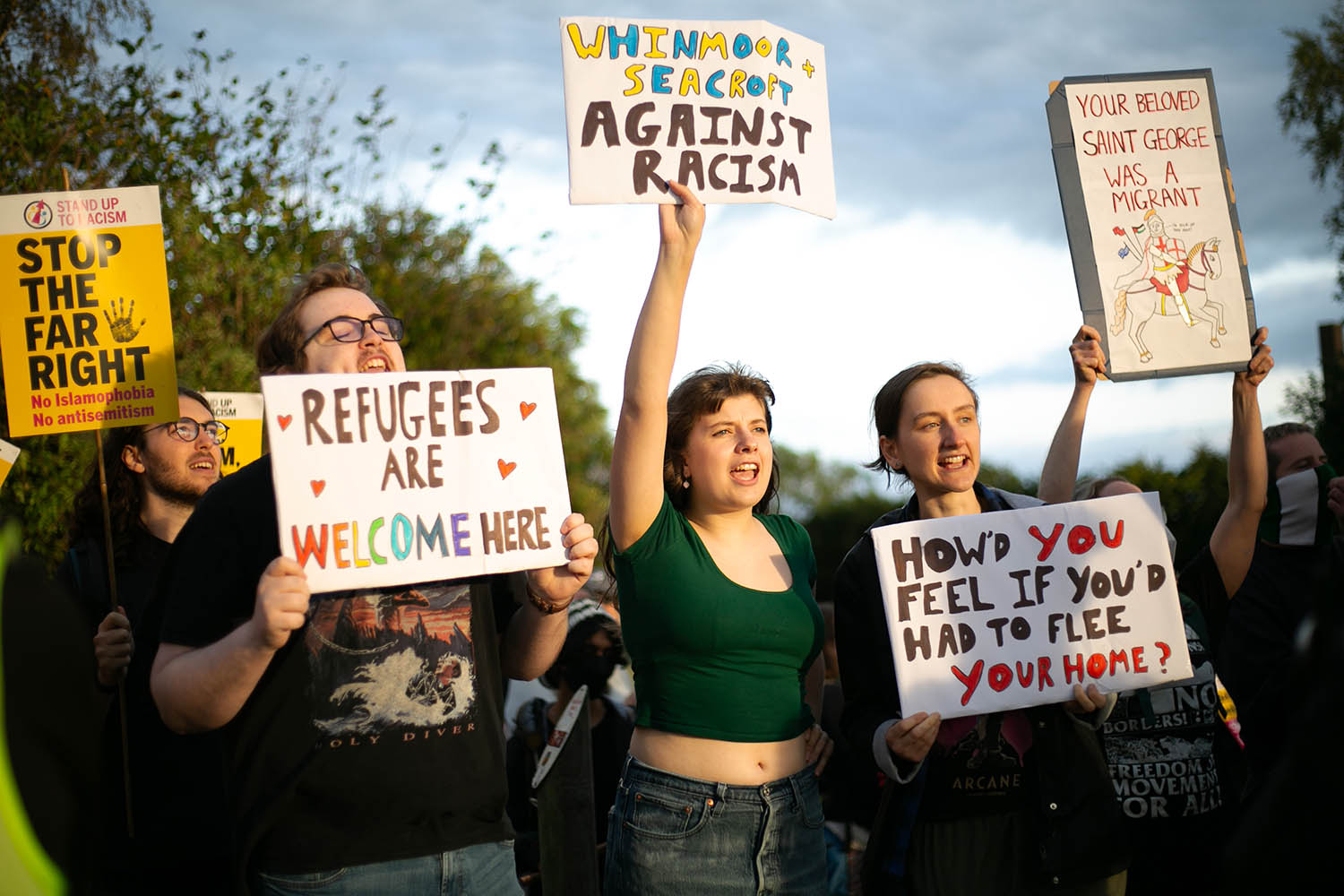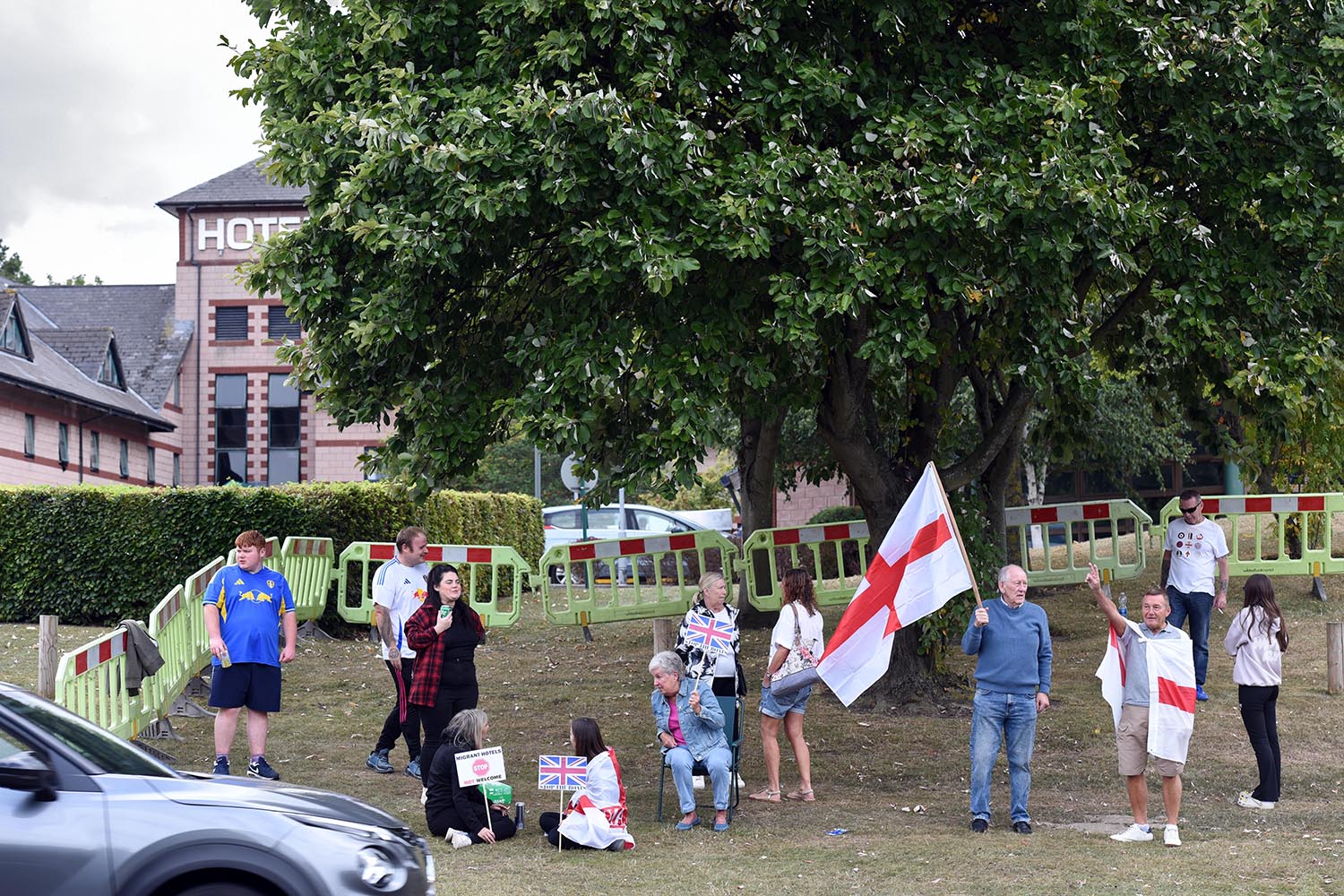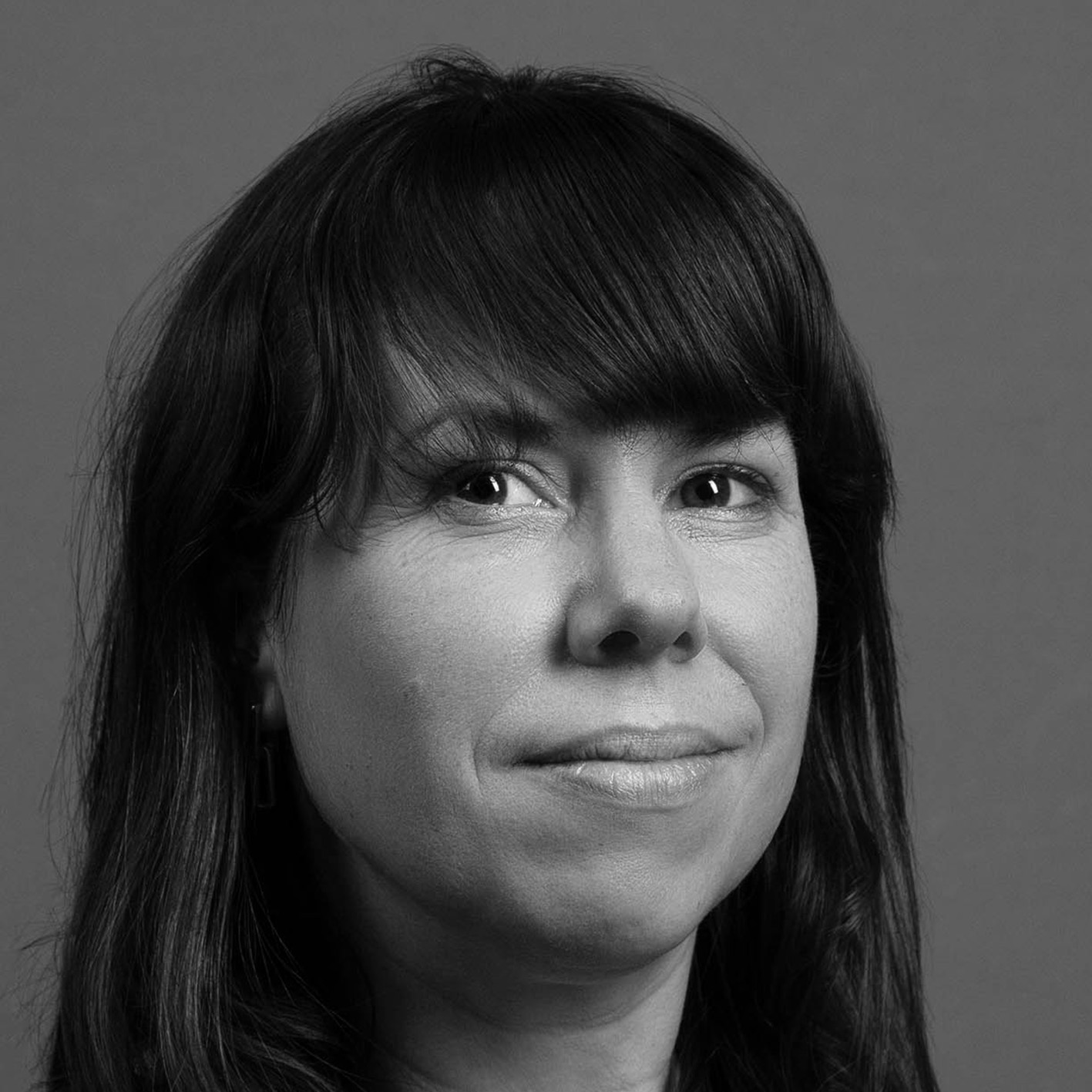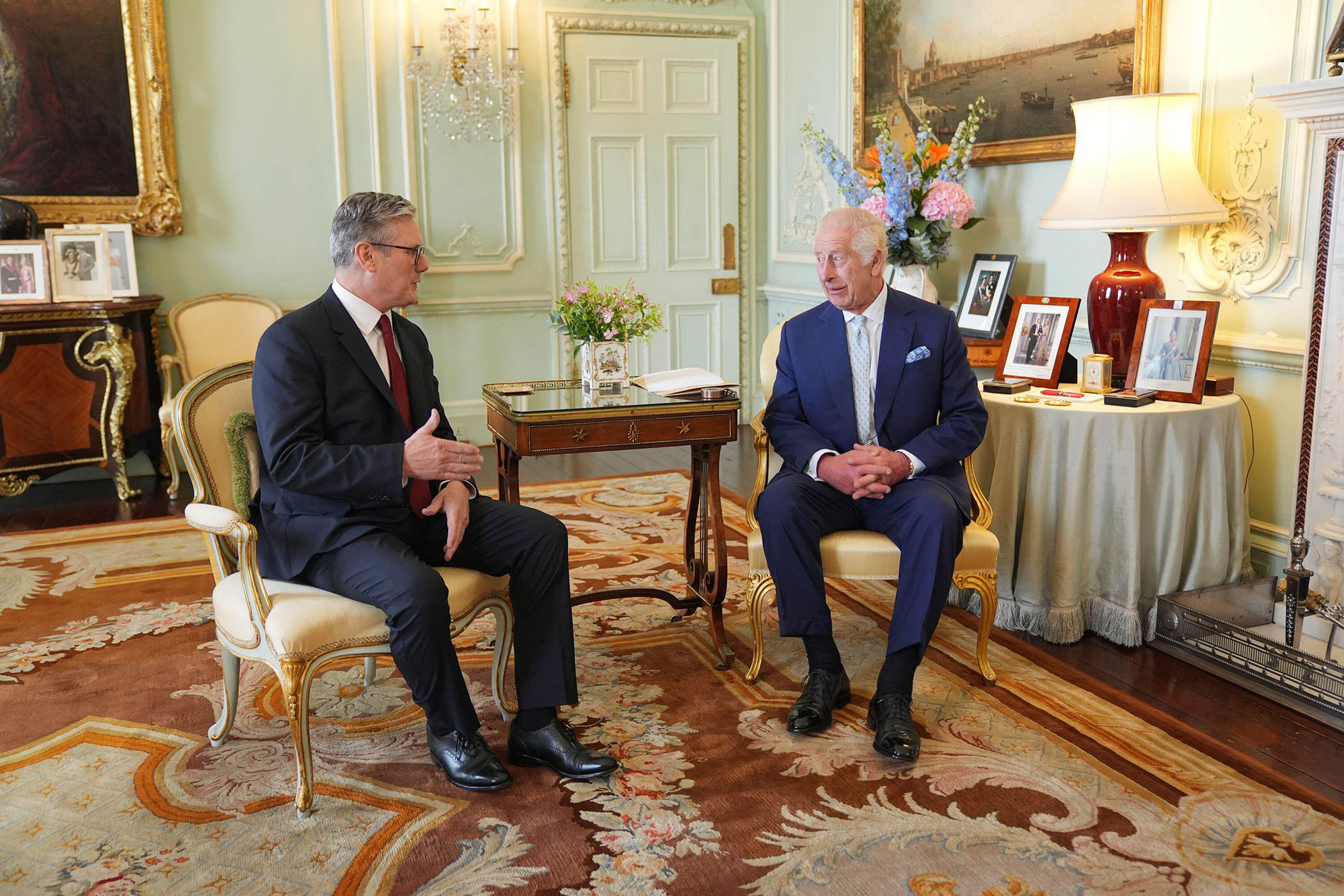The waitress shrugged. “It’s always like this,” she said. “Basically every day. It’s all anyone talks about. It’s even dividing families.”
She had just watched two customers at the small cafe in Epping on the verge of a fistfight as Britain’s latest febrile asylum row continued to tear the Essex market town apart.
“You’re a stereotypical person blaming all your problems on black and brown people. It’s racist and I’m sick of it,” Adrian Hutchins, 56, said before an older man rose to his feet.
“You made it personal,” the older man said, squaring up to him. “It’s not personal. I haven’t got a racist bone in my body. This is about them coming here illegally – I don’t care whether they are black, brown, pink, yellow or …” pulling at the corners of his eyes “slitty-eyed people.”
About a mile away a flag bearing the St George’s cross has been attached with cable ties to a drainpipe on the Bell Hotel. It has appeared in the past 10 days or so. Like others on the streets of Epping, it was put up in the dead of night.
Weeks of protests at the hotel followed the arrest and charge of an asylum seeker on allegations of sexual offences including attempting to kiss a teenage girl on 7 and 8 July. He denies the charges.
The Epping protesters’ tactics, which led to 27 arrests in clashes with counter-protesters and police, are seen as a playbook for forcing asylum seekers out of communities.
Yesterday, under the banner Abolish Asylum System, similar groups planned to take their protests nationwide, to towns and cities including Bristol, Tamworth, Liverpool, Newcastle, Horley in Surrey and Canary Wharf in London.
If they were hoping to take control of the streets, it didn’t happen; they could barely muster enough people to cover the pavement in some places. Only a few dozen anti-migrant activists showed up for a march through Liverpool, carrying Ukip banners and holding wooden crucifixes. They were outnumbered by at least 300 counterprotesters from Stand Up to Racism.
There were minor scuffles with police at several protests and officers struggled to contain a group in Horley who had draped themselves in Union flags and launched into chants of Tommy Robinson.
Newsletters
Choose the newsletters you want to receive
View more
For information about how The Observer protects your data, read our Privacy Policy
‘Epping is a special place... the atmosphere is horrible right now’
‘Epping is a special place... the atmosphere is horrible right now’
Razia Sharif, councillor
The name of the far-right campaigner was on the lips of many in Epping. Protests began after the arrest of Hadush Kebatu, 38, one of about 140 men awaiting asylum decisions being housed at the Bell Hotel, which has been doing this on and off for about five years. Kebatu, who arrived by small boat on 29 June, denies three counts of sexual assault, one of inciting a girl to engage in sexual activity and one of harassment.
Last Wednesday Epping Forest council won an interim injunction against the hotel’s owners, Somani Hotels, for breach of planning permission. A high court ruling found the hotel’s changed role constituted a "loss of amenity", with the impact of the protests playing a role in that finding. At least nine other councils –many Labour run – are considering similar action.
On Friday the Home Office announced that it would seek to overturn the ruling and require the hotels to be closed in an orderly way. The hotel group is also lodging an appeal.
Home secretary Yvette Cooper reiterated her commitment to ending the use of asylum hotels, which are currently home to just over a third of asylum seekers. Officials have scrambled to find alternatives, from private accommodation, empty tower blocks and vacated MoD buildings to university buildings and even barges. The possibility of offshore processing has also resurfaced, although precisely where is unclear: not Rwanda, given how vocally Labour opposed the Conservatives’ attempt, and not Albania, which did a deal with Italy instead.
Current figures show 32,059 people are being housed in hotels – about 3,000 more than when Labour was elected but down from 56,042 in September 2023. There has also been a record number of Channel crossings this year, despite attempts to stop them.
Epping is awash with either accusations of racism or stern denials of it. Epithets such as “far-right” and “racist” are denied and white residents often feel the need to mention non-white friends. Conversations can begin with the hotel and protection of women and girls before pivoting to the economic burden on the country, the unfairness of people entering illegally, the state of public services, taxes and wealth inequality.

There is a deep distrust of the system and the people using it, who are considered to be lying about their histories and coming to claim benefits. But at some point, almost every conversation descends into misinformed, anti-Muslim tropes.
In the cafe where the row had broken out, the waitress, in her 20s, said she believes that Muslims don’t want to integrate into UK society. Asked whether she believed a Muslim doctor, nurse, lawyer or teacher had integrated, she said: “That’s because they are trying to take over.”
Last summer's riots in Southport, sparked by misinformation suggesting the murderer of three young girls was Muslim, loomed large in Epping.
Steve, a retired businessman in his 70s, has been attending regular protests at the Bell. He said that men “of fighting age” are “breaking into our country”. He added: “A friend told me, and I don’t know if I believe this, that there are containers dotted around the country with caches of weapons.”
Residents said they had seen men from the hotel filming schoolgirls and loitering near schools, and talked about increased shoplifting at supermarkets. In a neighbouring cul de sac, women said they had felt intimidated and would not walk home alone.
There was also a widely held belief in alleged two-tier policing, with non-white crime ignored, and many mentioned Lucy Connolly, the wife of a Tory councillor. She was jailed for 31 months for inciting racial hatred by calling for asylum hotels to be torched. She was released last Thursday and has since said she was Keir Starmer’s “political prisoner”.
. Ministry of Justice data shows that in fact people of “white British” ethnicity are treated more leniently in the justice system, particularly over custodial sentences.
Responding to the high court ruling, one Bell resident, Khadar Mohamed, appealed to the people of Epping. “Please don't do this to us,” he said in an interview with ITV News. “If you move us, everyone else will want to do the same to us.”
Razia Sharif, a former BBC news presenter and now Lib Dem councillor for Epping west ward, home to the Bell Hotel, said: “I’ve lived in Epping since 2012. It’s a very, very special place.” She said she lives minutes from the hotel and that some of its residents had been helping out at the food bank where she volunteers.

For the non-white population of Epping the atmosphere is “horrible right now,” she said. “I’ve had emails saying we don’t feel safe going out.”
On her own experience of anti-Muslim hatred, she said: “I’ve had death threats. I’ve had people shouting through my letterbox saying they’re going to behead me.”
On the flag-lined road into Epping, Shofik, 36, a taxi driver from Whitechapel, east London, was working in the area. “I know in their heads they are not doing anything wrong, [but] when I was growing up we had the BNP throwing firebombs at houses,” he said. “It’s hard to believe we’re basically back there again.”
Photographs by Asadour Guzelian, Richard Saker/The Observer, Henry Nicholls/AFP/via Getty




